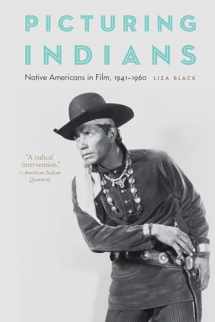
Picturing Indians: Native Americans in Film, 1941–1960
Book details
Summary
Description
Standing at the intersection of Native history, labor, and representation, Picturing Indians presents a vivid portrait of the complicated experiences of Native actors on the sets of midcentury Hollywood Westerns. This behind-the-scenes look at costuming, makeup, contract negotiations, and union disparities uncovers an all-too-familiar narrative of racism and further complicates filmmakers’ choices to follow mainstream representations of “Indianness.”
Liza Black offers a rare and overlooked perspective on American cinema history by giving voice to creators of movie Indians—the stylists, public relations workers, and the actors themselves. In exploring the inherent racism in sensationalizing Native culture for profit, Black also chronicles the little-known attempts of studios to generate cultural authenticity and historical accuracy in their films. She discusses the studios’ need for actual Indians to participate in, legitimate, and populate such filmic narratives. But studios also told stories that made Indians sound less than Indian because of their skin color, clothing, and inability to do functions and tasks non-Indians considered authentically Indian. In the ongoing territorial dispossession of Native America, Native people worked in film as an economic strategy toward survival.
Consulting new primary sources, including pay records and unpublished publicity photographs, Black has crafted an interdisciplinary experience showcasing what it meant to “play Indian” in post–World War II Hollywood.


We would LOVE it if you could help us and other readers by reviewing the book
Book review



